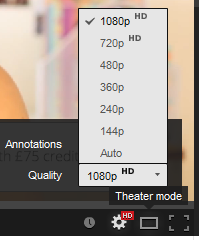In TV and film, HD comes in different modes, 720p, 1080i, 1080p and 1440p.
On video websites for example youtube, you get to choose the picture quality, with 720p and 1080p being the HD options.
The aspect ratios for TV and film are 4:3 for a standard full screen TV and 16:9 for a widescreen, cinema movie screens are 2.39:1. - X
16:9 is the better aspect ratio for TV programmes because it's close to what you get at the cinema, it makes the picture quality better by allowing bolder backdrops and scenery. 2.39:1 is the best aspect ratio for films as cinemas shoot in an anamorphic format which is what's used on cinema widescreens.
XLR, line-level, mic-level and ADAT are all types of audio signals.
The different types of video signals are; composite, component and HDMI. - X
Types of digital filming are compact digital cameras, bridge cameras, mirrorless interchangeable-lens cameras, modular cameras, digital single-lens reflex cameras, Digital Single Lens Translucent (DSLT) cameras, line-scan camera systems, digital range finders, integration and waterproof. - X
Types of storage are memory cards, floppy dicks, hard discs.
It was turned off so that all TV viewers would need to use Freeview, satellite or cable.
You can record TV using a PVR - X
You can also use sky+ service where you find a programme and press record to watch at another time.
Some different editing software's are; Final Cut Pro, Adobe Premiere Express and iMovie.
Out of these editing software's, I'd say iMovie is the best. It sounds to be the best out of the three because it says that the software is speedy which is what any editor will want opposed to final cut pro which can take a while - from past experiences anyway. It also seems to offer good features like the slow mo scrubber timeline so you cans review your work in a different way and the importing process is streamlined to it's straight forward and simple from the sounds of it.
I think HD is better when it comes to the big screen, I don't feel like it's necessary on a small screen - phones and tablets. This article backs up what I think, it says how HD is wasted on Kindle Fire size screens but I think it's more beneficial on bigger TV's and film screens as it means the image quality is better.






No comments:
Post a Comment